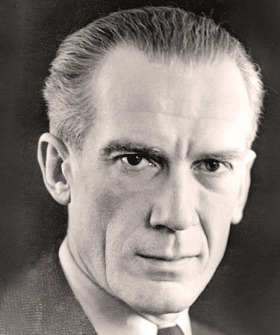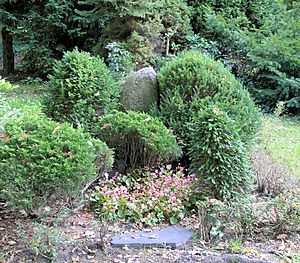Leo Borchard facts for kids
Leo Borchard (born March 31, 1899, died August 23, 1945) was a talented conductor. He had both German and Russian roots. For a short time, he was the main musical leader of the famous Berlin Philharmonic orchestra.
Contents
Biography of Leo Borchard
Early Life and Musical Start
Leo Borchard was born in Moscow, Russia. His parents were German. He grew up in Saint Petersburg, another big city in Russia. There, he learned a lot about music. He also often visited the Stanislavsky Theatre, a famous place for plays and operas.
In 1920, after the Russian Revolution, Leo moved to Germany. He became an assistant to Otto Klemperer at the Kroll Opera in Berlin. Klemperer trusted Borchard to help him improve his conducting.
Facing Challenges in Nazi Germany
Leo Borchard first conducted the Berlin Philharmonic in January 1933. But in 1935, the Nazi government stopped him from working. They thought he was not loyal to their ideas.
Even though he was banned, Leo kept teaching music. He taught students at his home. He also met with friends like Boris Blacher and Gottfried von Einem. These friends shared his dislike for the Nazi government.
Secret Work During World War II
During World War II, Leo Borchard stayed in Berlin. He secretly worked against the Nazi government. He used a different name, Andrik Krassnow. He helped people who were also resisting the Nazis. This included working with Ludwig Lichtwitz, who made fake identity papers.
Leading the Berlin Philharmonic After the War
After Germany surrendered in World War II, Leo Borchard quickly returned to conducting. On May 26, 1945, he led the Berlin Philharmonic. This concert was very popular. It featured music by Felix Mendelssohn, Wolfgang Amadeus Mozart, and Pyotr Ilyich Tchaikovsky.
Just one week later, a Soviet official named Nikolai Berzarin chose Leo to be the new musical director. He replaced Wilhelm Furtwängler. Leo was a good choice because he had stood up to the Nazis. He also spoke Russian, which helped him work well with the Soviet leaders. He conducted 22 concerts as the main conductor of the Berlin Philharmonic.
A Tragic End
On August 23, 1945, after a concert, Leo Borchard and his partner, Ruth Andreas-Friedrich, had dinner with a British colonel. They enjoyed the evening and good food. Later, the colonel offered to drive them home in his official car.
There was a curfew at 10:45 PM. As they drove, their British driver misunderstood a signal from an American guard. The car drove through a checkpoint between the British and American zones in Berlin. The guards fired at the car. Leo Borchard was killed instantly. His partner and the driver survived. After this sad event, military checkpoints were made clearer to prevent similar accidents.
Memorials and Tributes
Honoring His Memory
In 1943, the composer Gottfried von Einem dedicated his "Capriccio for Orchestra" to Leo Borchard. Borchard himself conducted its first performance with the Berlin Philharmonic.
In October 1988, a special plaque was placed in Berlin. It marked the former home of Leo Borchard and Ruth Andreas-Friedrich.
In April 1990, a music school in Berlin was named the Leo-Borchard-Musikschule. Today, it is known as the largest music school in Germany.
On September 5 and 6, 1995, Claudio Abbado and the Berlin Philharmonic honored Leo Borchard. They performed Mahler's 6th Symphony to mark the anniversary of his death.
Recordings by Leo Borchard
Leo Borchard's performances were recorded. Here are some of the pieces he conducted:
- Boccherini – Minuet
- Delibes – Mazurka & Valse Lente from Coppelia
- Françaix – Piano Concertino
- Glazounov – Stenka Razin*
- Puccini – orchestral selection from Tosca
- Rebikov – Berceuse
- Suppé – Overture to Banditenstreiche
- Tchaikovsky – Fantasy Overture, Romeo and Juliet*; Excerpts from The Nutcracker
- Wagner – Wotan's Farewell
- Weber – Overture Oberon*
(* These were broadcasts from June 1945)
See also
 In Spanish: Leo Borchard para niños
In Spanish: Leo Borchard para niños
 | Roy Wilkins |
 | John Lewis |
 | Linda Carol Brown |



